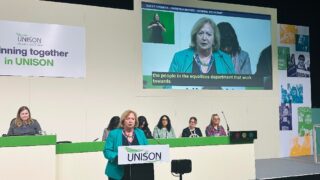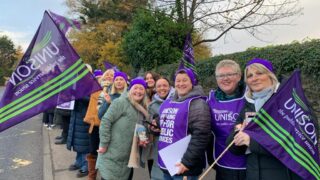On an eventful second day of the 2013 Irish Congress of Trade Unions (ICTU) conference, Northern Ireland’s deputy first minister Martin McGuinness made a call for a Bill of Rights.
During his keynote speech, Mr McGuinness said that Northern Ireland was suffering from “social and economic injustices”.
“One of the steps towards fixing this”, Mr McGuinness told the conference, “is for a recognised Bill of Rights, the foundations of which were set out in the Good Friday Agreement”.
The Good Friday Agreement was a widely-discussed topic on the day, as the morning session was dominated by motions focusing on Northern Ireland.
First up, motion 11, dealing with economic decision making in Northern Ireland, was debated, with UNISON representative Ruairi Creaney bemoaning the “orgy of violence and greed” evident in capitalist society.
Motion 11 passed, as did motion 12, which dealt with sectarian tensions and community divisions.
Motion 13, on the treatment of older people, saw UNISON’s Marjorie Trimble speak passionately about the attempt of the health minister Edwin Poots to close Northern Ireland’s residential care homes.
“We are seeking a pledge from MLAs to stand with us in our opposition to NHS residential care home closures and to send a clear message to the heath minister that he needs to reverse his policy of closing the homes” said Ms Trimble.
Motion 13 passed, along with motion 14, which was moved by UNISON regional secretary Patricia McKeown and paid tribute to the recently deceased Inez McCormack, a former UNISON regional secretary and the first female president of the ICTU.
Community relations initiatives – motion 15 – were also passed by conference. Equality and discrimination was also passionately debated by UNISON activists, with head of organising Pamela Dooley calling on women to be represented proportionally at ICTU’s top table.
Ms McKeown told conference: “prejudice and discrimination all rise to the surface during tough economic times”, while UNISON’s Fidelma Carolan said: “the trade union movement is the only movement that can wipe out homophobia in the workplace”.
This motion was passed along with motion 17 (violence against women), motion 18 (collective bargaining), motion 19 (whistleblowing), motion 20 (freelance workers), motion 21 (employment and social cohesion).
On motion 22 (decent contracts and living wage), UNISON’s Gabrielle Carton said: “It is time for the Irish and UK governments to take a step towards equality and fairness and make the living wage the minimum wage.” The motion passed.
As did motions 23 and 24 (decent jobs and youth unemployment). Motion 25 (decreasing membership) was passionately argued for by Flora Alfante, a member of UNISON’s Black and ethnic minorities group, who said: “go back to all your branches and start recruiting young people and migrant workers!”
This motion was passed along with 26 (pensions), 27 (globalisation fund) and 28 (casualisation). The conference enters its final day today.



